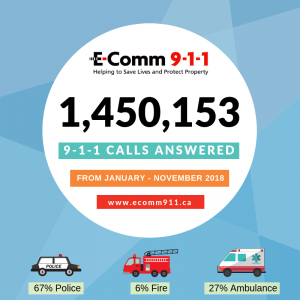
So far in 2018 (to the end of November), E-Comm’s provincial 9-1-1 call volume is 1,450,153:
- 67 per cent of calls are for police
- 27 per cent of calls are for ambulance
- 6 per cent of calls are for fire
Our service level target is to answer 95 per cent of 9-1-1 calls in five seconds or less. To the end of November, our service level is 98 per cent. The total number of 9-1-1 calls are for E-Comm’s service area: 26 regional districts and communities spanning from Vancouver Island to Alberta and from the U.S. borders to north of Prince George.
Find out more about our 9-1-1 call statistics.
We also received a total of 40 Text with 9-1-1 (T9-1-1) calls so far in 2018. T9-1-1 is a specialized texting service available for people who are Deaf/Deaf-Blind, Hard-of Hearing or Speech Impaired (DHHSI) that allows registered users to communicate with 9-1-1 call-takers through text. Find out more about T9-1-1.
The fall 2018 edition of e-communiqué, E-Comm’s quarterly stakeholder newsletter, is now available online and in PDF format. Check out our publications page to view previous issues.
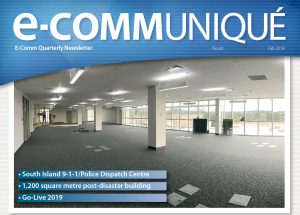
In this edition you’ll find:
- An update on the final construction details of the new South Island 9-1-1/Police Dispatch Centre in Saanich. Scheduled to open in early 2019, the centre amalgamates 9-1-1 call-answer and police dispatch services for the Victoria, Saanich, Central Saanich and Oak Bay police departments and local RCMP detachments.
- CEO Oliver Grüter-Andrew’s recaps his first full year in his role and looks ahead to the development of E-Comm’s new strategic plan.
- Discover how E-Comm’s Wide-Area Radio Network in the Lower Mainland is helping police, fire and ambulance personnel communicate with each other to arrest suspects, fight fires and save lives.
- Learn more about E-Comm staff fundraising for, and riding as guest riders with, Cops for Cancer. E-Comm’s corporate donation combined with staff fundraising totalled $7,500 for the Canadian Cancer Society.
- See how E-Comm connected with the community at various events from July to September, sharing tips with the public about calling 9-1-1.
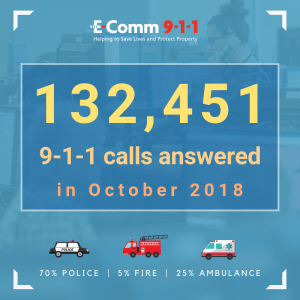
In October 2018, we’ve answered 132,451 9-1-1 calls.
So far in 2018 (to the end of October), E-Comm’s provincial 9-1-1 call volume is 1,324,951:
- 67 per cent of calls are for police
- 27 per cent of calls are for ambulance
- 6 per cent of calls are for fire
Our service level target is to answer 95 per cent of 9-1-1 calls in five seconds or less. To the end of October, our service level is 98 per cent. The total number of 9-1-1 calls are for E-Comm’s service area: 26 regional districts and communities spanning from Vancouver Island to Alberta and from the U.S. borders to north of Prince George.
Find out more about our 9-1-1 call statistics.
We also received four Text with 9-1-1 (T9-1-1) calls in October, for a total of 40 calls so far in 2018. T9-1-1 is a specialized texting service available for people who are Deaf/Deaf-Blind, Hard-of Hearing or Speech Impaired (DHHSI) that allows registered users to communicate with 9-1-1 call-takers through text. Find out more about T9-1-1.
Halloween is just around the corner! It’s a fun and spooky time of the year with many exciting events – which is why it’s also important to know when and when not to call 9-1-1.
Here are some tips on what to do when calling 9-1-1:
- Listen carefully, speak clearly and try to remain calm.
- Stay on the line and follow instructions. Your 9-1-1 call taker will stay on the line with you to make sure your call is answered by the agency you need. Don’t hang up until the call taker says it’s okay to.
- Know your location at all times and communicate it when you are asked.
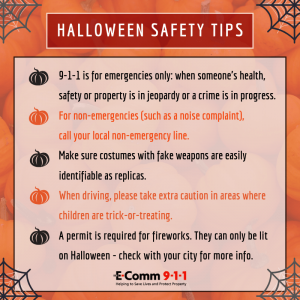
Learn more about the 9-1-1 tips and information.
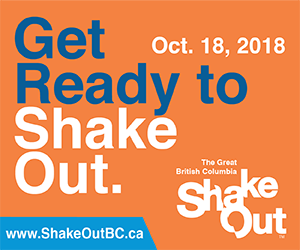 B.C. residents are getting ready to shake out!
B.C. residents are getting ready to shake out!
On October 18 at 10:18 a.m., it’s time to take part in the Great British Columbia Shake Out. We’re joining millions around the world to practice how to “drop, cover and hold on” in the event of an earthquake. Find out more details about participating in the drill.
Here’s some important information about calling 9-1-1 after a real earthquake:
- After the shaking stops and it’s safe to come out from cover, ensure all phones are on the hook
- Do not use the telephone immediately unless a life is at stake
- If you have a serious emergency, dial 9-1-1. If you hear a busy signal, hang up and dial again. If you receive a recorded announcement, stay on the line and wait for a call-taker. Do not hang up. Your call will be answered as soon as possible.
- Do not call 9-1-1 for general information or to ask questions about the earthquake
- Help keep 9-1-1 lines free for those with serious emergencies
- Listen to your radio and TV for instructions and information, including finding out when it’s clear to telephone relatives and friends
Download our Dialing 9-1-1 after an Earthquake info card.






 B.C. residents are getting ready to shake out!
B.C. residents are getting ready to shake out!